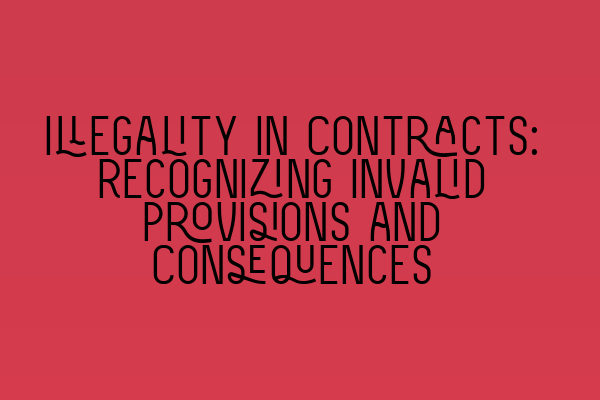Illegality in Contracts: Recognizing Invalid Provisions and Consequences
Contracts are the foundation of any business transaction, providing the legal framework that protects the rights and obligations of the parties involved. However, not all contract provisions are valid and enforceable. Some provisions may be deemed illegal, rendering the entire contract or specific clauses unenforceable. It is crucial to understand the concept of illegality in contracts to avoid potential legal pitfalls and ensure compliance with the law.
What is Illegality in Contracts?
Illegality in contracts refers to the inclusion of provisions that are contrary to the law, public policy, or involve illegal activities. When a contract contains an illegal provision, it is considered void and unenforceable by the courts. Recognizing and understanding these invalid provisions is essential to protect your interests and avoid legal consequences.
Identifying Invalid Provisions
Invalid provisions can take various forms, and it’s essential to be aware of the most common types:
- Contrary to Statute: Contracts that violate specific statutes or legislation are considered illegal. For example, an agreement to engage in money laundering or to sell prohibited substances would be void as it goes against the law.
- Contrary to Public Policy: Contracts that are against public policy, which includes activities or provisions deemed harmful to society, will also be unenforceable. These may include contracts involving fraud, bribery, or agreements that encourage illegal conduct.
- Restraint of Trade: Clauses that unreasonably restrict a person’s ability to trade or seek employment are considered against public policy. Non-compete agreements that go beyond what is necessary to protect legitimate business interests may be unenforceable.
- Unconscionable Contracts: Contracts that are deemed grossly unfair or oppressive can be considered unconscionable and may be set aside by the courts. This typically occurs when there is a significant power imbalance between the parties or when one party takes advantage of another’s vulnerability.
- Illegal Purpose: If the purpose of the contract is illegal or involves illegal activities, the entire contract may be deemed unenforceable. For example, an agreement to commit fraud or engage in criminal activities would be void.
Consequences of Illegality in Contracts
When a contract or specific clauses are deemed illegal, the consequences can be significant:
- Unenforceability: Contracts containing illegal provisions are unenforceable, meaning that neither party can rely on the contract to enforce their rights or seek remedies for breaches.
- Void Ab Initio: If a contract is void ab initio, it is treated as if it never existed. The parties are returned to their pre-contractual positions, and any benefits they received under the contract must be returned.
- Liability for Damages: Despite the contract being unenforceable, parties may still be liable for damages resulting from their illegal actions or breach of contract before the illegality was discovered.
- Criminal Consequences: In some cases, engaging in illegal activities through a contract may lead to criminal charges and legal penalties. It is essential to consult with a legal professional to mitigate any potential criminal consequences.
Overall, it is crucial to ensure that your contracts comply with the law and do not include any illegal provisions. Engaging the services of a qualified solicitor experienced in contract law can help navigate potential pitfalls and ensure your agreements are valid and enforceable.
For more information and resources on preparing for the SQE(1 and 2) exams or to practice mock quizzes, visit SQE 1 Practice Exam Questions and SQE 1 Practice Mocks FLK1 FLK2. To explore SQE preparation courses, SQE 2 Preparation Courses and SQE 1 Preparation Courses are available. For important SRA SQE Exam Dates, refer to SRA SQE Exam Dates.
